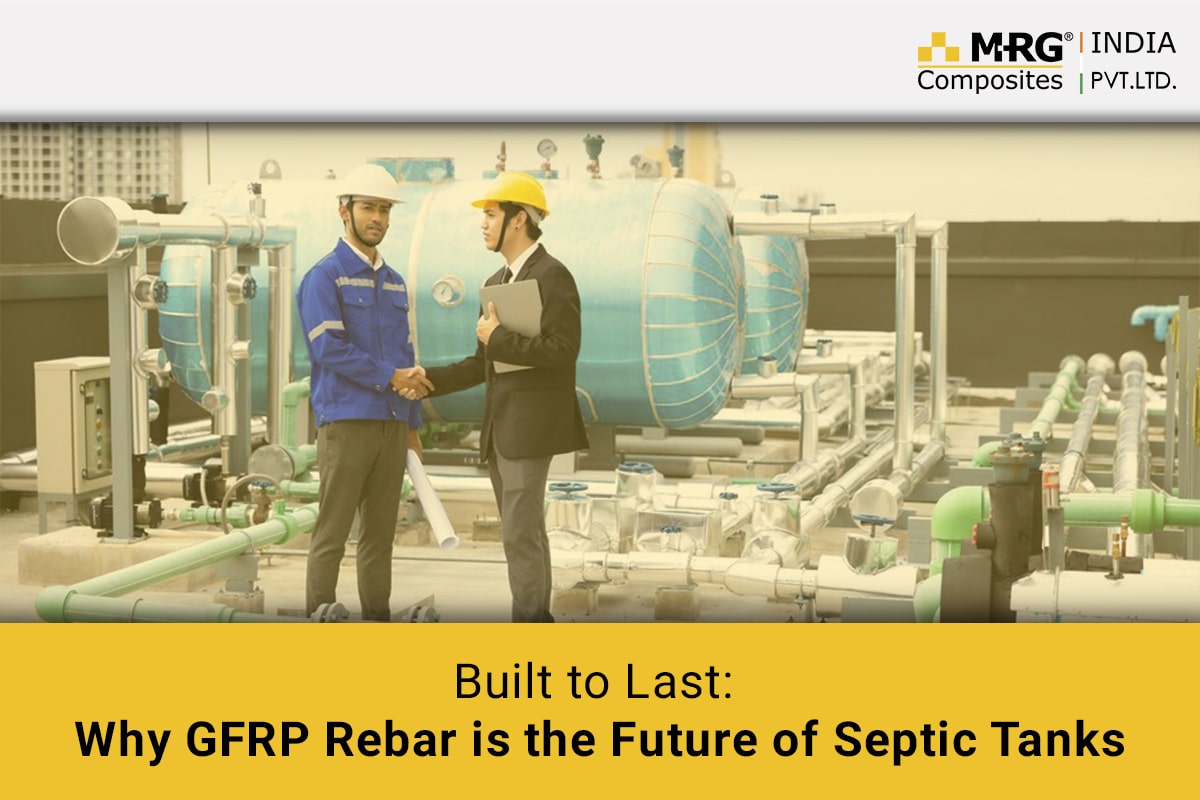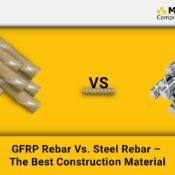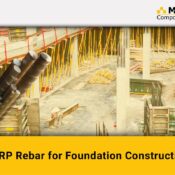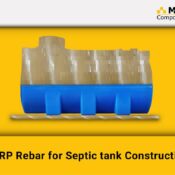Built to Last: Why GFRP Rebar is the Future of Septic Tanks

For decades, traditional steel rebar has been the go-to material for reinforcing concrete septic tanks. But times are changing. Homeowners and septic system professionals are increasingly looking for stronger, more durable, and long-lasting solutions. This is where Glass Fiber Reinforced Polymer (GFRP) rebar steps in, poised to revolutionize the septic tank industry.
The Problems with Traditional Steel Rebar in Septic Tanks
While steel rebar has served its purpose, it comes with inherent drawbacks that can lead to premature septic tank failure. Here’s why steel rebar might not be the best choice for your septic system:
- Corrosion: Steel is susceptible to corrosion caused by moisture, chemicals present in wastewater, and acidic soil conditions. This corrosion weakens the rebar, leading to cracks in the concrete and potential leaks.
- Limited lifespan: Corroded steel rebar loses its structural integrity, reducing the overall lifespan of the septic tank. This can lead to costly repairs or even complete tank replacement.
- Increased maintenance: Steel-reinforced tanks may require more frequent inspections and maintenance due to the risk of corrosion.
The Advantages of GFRP Rebar for Septic Tanks
GFRP rebar, also known as fiberglass rebar, offers a compelling alternative to traditional steel. Here’s how GFRP rebar surpasses steel in septic tank applications:
- Superior corrosion resistance: Unlike steel, GFRP rebar is completely immune to corrosion. It won’t rust or degrade when exposed to moisture, chemicals, or acidic soils. This ensures the long-term structural integrity of the septic tank.
- Exceptional strength: GFRP rebar boasts superior tensile strength compared to standard steel rebar. This translates to a stronger and more crack-resistant concrete structure, essential for withstanding the constant pressure exerted on the septic tank.
- Lightweight: GFRP rebar is significantly lighter than steel, making transportation, handling, and installation of septic tanks easier and more efficient.
- Long lifespan: GFRP rebar’s inherent corrosion resistance translates to a significantly longer lifespan for septic tanks. You can expect a GFRP-reinforced septic tank to last for decades without any structural issues.
- Reduced maintenance: Since GFRP rebar doesn’t corrode, septic tanks reinforced with it require minimal maintenance. This translates to significant cost savings over the lifetime of the system.
Beyond Durability: Additional Benefits of GFRP Rebar
The advantages of GFRP rebar extend beyond just exceptional durability. Here are some additional benefits that make it a superior choice for septic tanks:
- Environmentally friendly: GFRP rebar is a non-corrosive material that doesn’t leach harmful chemicals into the surrounding soil. In comparison, corroding steel rebar can contaminate the soil and groundwater.
- Radio Frequency (RF) transparency: GFRP rebar is transparent to radio waves, making it ideal for areas where locating underground septic tanks is crucial. This simplifies future maintenance or system upgrades.
- Improved concrete bond: GFRP rebar’s surface texture allows for a superior bond with concrete compared to steel. This stronger bond further enhances the structural integrity of the septic tank.
Choosing the Right Septic Tank Solution
When selecting a septic tank, opting for one reinforced with GFRP rebar is a wise investment. Here’s why:
- Peace of mind: GFRP rebar offers peace of mind knowing your septic tank is built to last. You won’t have to worry about premature failure due to corroded steel rebar.
- Cost savings: While the initial cost of a GFRP-reinforced septic tank might be slightly higher, the long lifespan and minimal maintenance needs translate to significant cost savings in the long run.
- Environmentally responsible choice: By choosing GFRP rebar, you’re making an environmentally responsible decision by opting for a non-corrosive material that won’t harm the surrounding soil.
Optimizing Septic Tank Design with GFRP Rebar
GFRP rebar’s unique properties allow for innovative septic tank designs. Here’s how:
- Lighter weight facilitates precast construction: Prefabricated septic tanks made with GFRP rebar offer several advantages. They can be manufactured in a controlled environment, ensuring consistent quality and faster installation. Additionally, the lighter weight of GFRP rebar makes precast tanks easier to transport and maneuver during installation.
- Reduced environmental impact: Prefabricated GFRP septic tanks minimize on-site construction time, reducing soil disruption and environmental impact.
Applications Beyond Traditional Septic Tanks
The benefits of GFRP rebar extend beyond traditional septic tanks. It’s also ideal for:
- Drainage systems: GFRP rebar’s corrosion resistance makes it perfect for drainage systems exposed to harsh weather conditions and chemicals.
- Wastewater treatment plants: Similar to septic tanks, GFRP rebar’s durability ensures long-lasting performance in wastewater treatment applications.
- Underground structures: Due to its lightweight nature and radio frequency transparency, GFRP rebar is a suitable choice for reinforcing underground structures like manholes and utility vaults.
MRG Composite Rebar
MRG Composite Rebar is a leading GFRP Rebar manufacturers in india and supplies worldwide. Our bars are stronger, lighter, and cost-effective than steel reinforcement bars. We are best known for our GFRP rebar. Our GFRP bars are the perfect choice for bridge construction.We are a leading GFRP Rebar manufacturers in India and supplies all over the world. We provide the best GFRP Rebar price in India and all over the world.
MRG Composite Rebar can provide high-quality industrial flooring. One of our specialities is in flooring for industrial and commercial clients. Our floors can help you keep your business look best. We offer a variety of flooring options to choose from.
All Categories
Recent Posts
GFRP Rebar vs. Steel Rebar: Strength, Durability & Benefits
GFRP Rebar for Foundation Construction
GFRP Rebar for Septic tank Construction
MON-SAT 8:00-9:00
+91 69 863 6420




